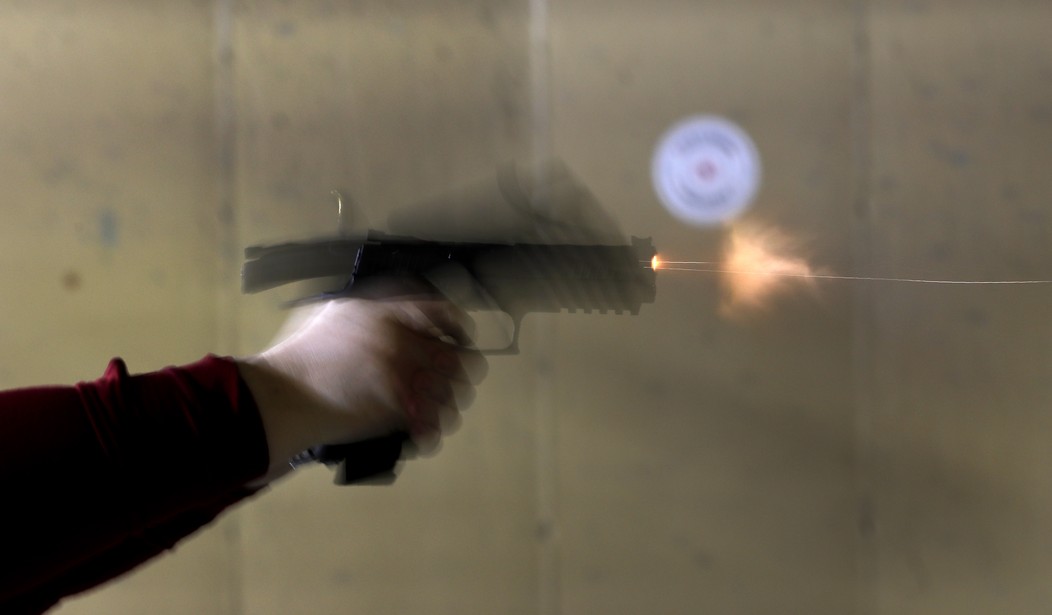Where do we draw the line in terms of self-defense? It’s a question that was asked after a video was posted by Andy Ngo that showed something of a feel-good video, depending on which team you’re on politically.
The video shows two masked robbers, one dressed in Antifa-style black block in a store. One jumps over the counter where the store employee stands. The employee doesn’t waste a moment and immediately charges after the Antifa member with a sharp object. It seems to take a moment for the Antifa member to realize he’s being stabbed repeatedly, but the pain finally seems to reach his brain, and the panic sets in. He calls out to his friend that he’s being stabbed and repeats “I’m dead” with increasing weakness. The video ends with the employee dragging the robber’s limp form away from the counter.
The video below is graphic and contains graphic language. Watch at your own discretion.
A robber in black bloc was stabbed & subdued by an Asian-American shop keeper wearing flip flops in Las Vegas this week. The robber’s accomplice leaves his friend behind. Police are investigating the robbery & stabbing. pic.twitter.com/EJrF6syO1d
— Andy Ngô 🏳️🌈 (@MrAndyNgo) August 5, 2022
The video prompted a question among Ngo’s followers. It was clearly wrong for the robbers to do what they did, but was the employee stabbing the robber repeatedly right to do? In the video, the robber who jumped behind the counter didn’t seem interested in assaulting the employee, but in stealing things behind the counter.
This is disheartening to see. The thief did not threaten him with a weapon, so the shop owner was not acting in self-defense. Taking away a life should never be a light matter people. Especially when it concerns theft without being armed.
— George (@GeoIbrahim01) August 5, 2022
I don’t have much information about where this took place, what was said before the stabbing occurred, or whether or not this employee is actually an owner of the store, but I’m here to tell you that it shouldn’t matter.
The employee did the right thing.
Let’s assume, for now, that the robbers had no intention of violence at all. Their main mission was to walk into the store, steal as much as they could, and leave without any physical harm done to anyone.
They’re still stealing. Those products that were in that store were bought and paid for by the store owner. He needs to sell them to the public in order to make money to keep his store afloat, pay employees, and hopefully expand his business. While it might not do anyone physical harm, harm is still being done that could result in the destruction of lives.
Then there’s the slippery slope problem. Let’s say they get away with stealing that time, who’s to say they won’t do it again and again, knowing they can just steal and get away with it? Who’s to say more won’t hear about this and add to the theft? Who’s to say that things won’t escalate and violence eventually does occur? Who’s to say it would stop at this man’s store as robbers get bolder and bolder in that area?
The question as to whether or not these things are worth killing someone over shouldn’t be on the store owner or the employee. The moment you begin stealing things from someone is the moment your life is forfeit. The store employee should be well within his or her rights to defend his or her property, and with fatal intent, if need be.
It’s the thief who needs to stop and weigh their lives with their intent. They need to consider if stuffing their bags with things that aren’t theirs is worth their life. They need to be scared that they’re going to get hurt. None of this should fall on the store owner, the resident, or the person walking down the street.
The hard truth about nature is that sometimes things are worth killing people over because those things are more than just things. They represent a person’s independence, hard work, personal connection, or whether or not they sink or swim.
The bottom line is that it’s the criminal, not the victim, who needs to be responsible for what happens when they find out.














